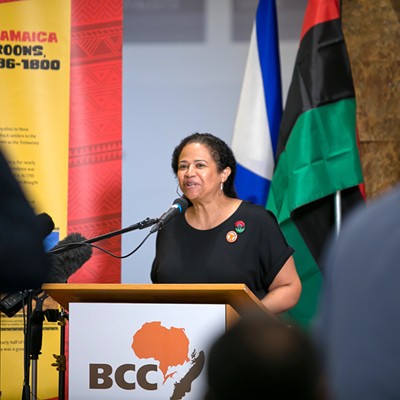December 6 made Jean Steinberg want to scream. So, last year, to mark the anniversary of the Montreal Massacre and the National Day of Action and Remembrance on Violence Against Women, she did.
Steinberg and a friend planned a moment of screaming---not silence---on the corner of Spring Garden Road and South Park Street. "It was amazing," says the 22-year-old Dalhousie student. "It was one of the most powerful moments."
Steinberg's contribution has become more than that, though. Her idea---born of frustration with "being silent for these 14 women and not taking it to the broader level and asking how many women in our lives have been affected by physical violence, sexual violence, emotional violence"---and her contribution to the December 6 planning committee has helped galvanize a shift in the meaning of the day.
Activism and a sense of looking forward are now entrenched in December 6, and that makes sense because, in the words of long-time December 6 organizer Kim Vance, "sadness can only take you so far."
"The violence in our community is very real," says Steinberg. "I would say every woman in my life has experienced it in some way, whether it's a cat-call on the street or whether it's being a survivor of assault."
This December 6 marks the 20th anniversary of the day Marc Lépine walked into Montreal's École Polytechnique and gunned down 14 women in a bid to "fight feminism."
To mark 20 years, the planning committee organized a 20-day campaign leading up to the vigil on December 6, which will be held in front of the main branch library on Spring Garden Road. (See events listings, page 50.)
The campaign launched November 16 with a screening of the 2009 Quebec docu-drama Polytechnique. Kim Vance was central to bringing in the film. Vance, now 41, was a student at Dalhousie in 1989. Polytechnique "was important to bring here," says Vance, "especially for women who are on campus now that may not have even been born. It's important that they be able to see and relate to the event and understand that the women on campus that day weren't that different than the women on campus today. It was a pretty common day on a pretty common campus. It could have been anywhere."
The Canadian Labour Congress (canadianlabour.ca) has created a series of postcards to be sent daily to Stephen Harper, with each card addressing a different issue, such as violence against women in the workplace, against immigrant women and the importance of maintaining the gun registry.
This year also includes a handful of events that put violence against women in a global context and that examine kinds of violence that are different than mere physical harm. Vance gives the example of a November 25 talk by Zimbabwean activist Veronica Ngwerume about gender roles and health. "In a context where women have no power," Vance says, "a disease like HIV/AIDS becomes a tool of violence."
This broader scope of events is welcomed by Jean Steinberg and other under-30 women on the planning committee. Steinberg calls December 6 inspiring and frustrating. "It's really important to honour those women and honour their families, but I just keep thinking about how many women over the past 20 years have lost their lives or have had their lives severely changed by violence, that we are not respecting in the same way.
"I find it a really difficult day in that I don't find there's as much focus on the current situation as there is on a reflection of the past. And I think part of that is how little we understand and recognize systemic violence in our community."
Vance agrees. "Even the night of the film screening, they found the body of a young woman from Burnt Church, who had been missing and then killed. And it's like: this continues to go on."


















